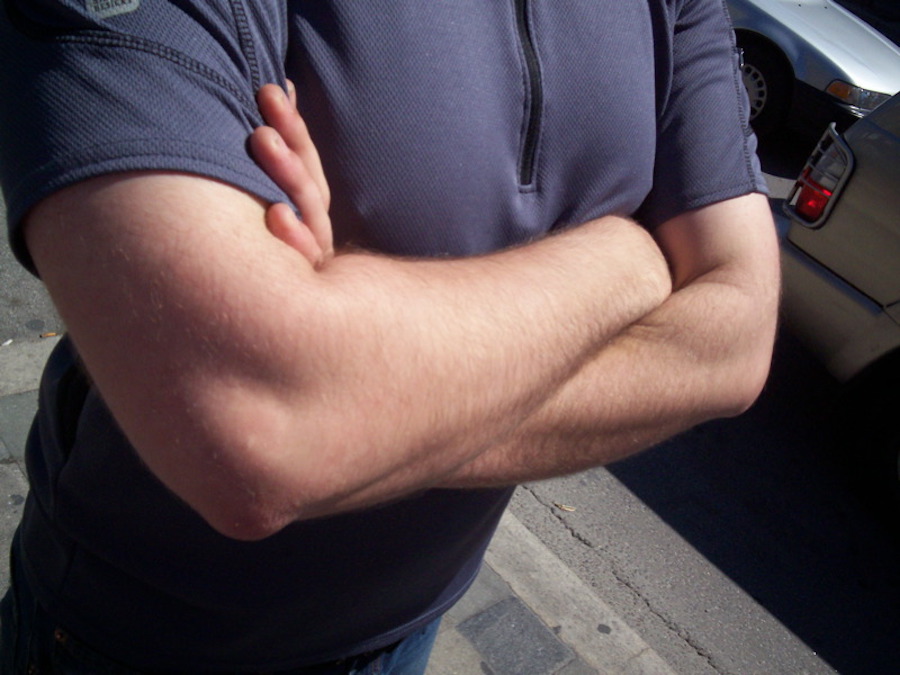
 In the movie “I Love You, Man,” Paul Rudd plays a newly engaged real estate agent who has trouble finding a best man for his wedding due to a lack of male friends. In the vein of comedy, Rudd’s character faces ridicule from his coworkers (and his fiance’s friends), kickstarting his search for the ultimate male buddy. We laugh as Rudd bounces between men, who are introduced by sympathetic acquaintances and family members, only to find little connection with them. The comedic value of “I Love You, Man” rests on the fact that men are less likely than women to maintain emotionally open relationships with their same-sex friends — and more likely to have fewer friends in general.
In the movie “I Love You, Man,” Paul Rudd plays a newly engaged real estate agent who has trouble finding a best man for his wedding due to a lack of male friends. In the vein of comedy, Rudd’s character faces ridicule from his coworkers (and his fiance’s friends), kickstarting his search for the ultimate male buddy. We laugh as Rudd bounces between men, who are introduced by sympathetic acquaintances and family members, only to find little connection with them. The comedic value of “I Love You, Man” rests on the fact that men are less likely than women to maintain emotionally open relationships with their same-sex friends — and more likely to have fewer friends in general.
According to Shao Li, a doctoral candidate in counseling psychology at UC Davis, this might reflect how men view their friendships in the context of social norms. Male friendships, Li observes, are often more “like a partnership, rather than [a safe place where] we can talk to about ‘how I feel so hurt today’ or how ‘that person hurt my feelings today.’”
Li, who is writing his dissertation on traditional concepts of masculinity, has seen ample differences in how the average man and woman deal with emotions.
“Stereotypically speaking, males are less likely to express their feelings,” Li said. “For females, it’s at least more socially acceptable to express their feelings. Sadness is expressed kind of differently. Females tend to express sadness directly. Sad is sad, nothing else. Males tend to express sadness as if there’s anger, rather than sadness.”
That the average man has less emotionally satisfying friendships than his female counterpart — and is spoofed for it in movies — is noteworthy for a few reasons. One, it reflects social norms of masculine and feminine behaviors, as Li suggests. And two, it reveals a cultural phenomenon in which men stay fortified against emotions in order to maintain images of power.
The movie “I Love You, Man” isn’t the only cultural icon that elicits the concept of male emotions. In the previous season of “Big Brother” — a reality show famous for filming its contestants 24/7 — there were two men who offered a perfect case study on masculinity.
Cody Nickson, a former Marine, embodied the muscle-bound and chisel-jawed hunk. His stoicism was notoriously difficult to engage with, alienating nearly everyone on “Big Brother.” When faced with dismissal from the show (and even a near-breakup with his girlfriend), Nickson barely grimaced.
Mark Jansen was also a muscley fellow — and a personal trainer to boot. Yet his personality belied his traditionally masculine exterior: He wasn’t afraid to show his emotions on live television. When Jansen realized his friends were leaving the show, he cried in front of the millions watching at home — and didn’t seem to care.
Two men, two different ways of showing emotion. One was apathetic and stone-faced, a tough military veteran who wouldn’t cry if his life depended on it. The other was a big teddy bear, a man able to show his grief and wear his emotions on his sleeve.
It was, admittedly, shocking to see Jansen bawl on TV. But where does this shock come from? We know that social norms teach boys and men to restrain their “weaker” emotions like Nickson in “Big Brother.” Meanwhile, the inner Jansens are shunned and buried. Sad emotions are reserved for women, so the mindset goes. Any slip-up, as we see with Jansen, is so incredible because it’s both rare and seemingly hostile to the ideal version of manliness.
The repercussions of this masculine apathy may be more pressing than we realize. Male behavior has been under intense scrutiny lately. The 2016 election revealed the widest gender gap between candidates in modern election history, with (white) men swinging rightward in droves. Many famous and powerful men have been exposed as sexual harassers and abusers, ranging from movie moguls like Harvey Weinstein and Kevin Spacey to Charlie Rose, the “60 Minutes” icon. Traditional power structures are eroding and new initiatives are introducing more women to fields like STEM, where men have generally dominated. The Women’s March following Donald Trump’s inauguration demonstrated a renewed vitality among women for women. The specificity here (“women’s” and not “men’s”) should be noted.
If men are under the microscope for bad behavior, it’s reasonable to ask where that behavior originates and what effect it has on society. What do we make of a culture that, while allowing men to engage in such egregious abuse and dominance at the expense of women, has a very real issue with the way men are expected to remain emotionally stunted while women are allowed to release their emotions without consequence?
The same culture that has historically preserved male dominance — in certain lines of work, in earnings, in sexual expression — has itself cultivated a system of male emotional repression that’s severely damaging. Sexual assault and harassment may be linked to this facet of masculinity.
“In traditionally masculine ideologies, [men] care about power, dominance, assertiveness and ambition,” Li said. “So if you possess more resources, that means you’re more powerful, you’re more deserving and you’re more manly” in this system.
According to Li, sex is one of these key resources that plays a role in the culture of masculinity. Objectification of women is another.
“It’s like they’re not human,” he said, speaking from the perspective of abusive men. “It’s like they’re my personal property, so I can take them. I can use them whenever I want, however I want. And that makes it even worse.”
Of course, men in power aren’t the only examples of a culture that needs to change. While it’s hard to pinpoint the number of normal men — those outside the millionaire suites that come with Hollywood and media fame — who’ve harassed women, it’s easy to reference social expectations that may influence how some men, powerful or otherwise, act toward women. Could emotional apathy be one of the culprits?
Some blueprints of manliness may offer clarity. Over at dictionary.com (an old favorite that’s been cited before), “manly” is defined as “having qualities traditionally ascribed to men, as strength or bravery.” “The Art of Manliness,” a lifestyle website catering to men, offers readers advice on dealing with the fact that “modern men are confused about their role and what it means to be an honorable, well-rounded man.”
Beyond the questions raised by how men are now “confused,” these definitions come at a cost. Social expectations of masculinity — aloof, unemotional, angry, violent — coupled with such ingrained dictionary entries are problematic at best. Men have historically used biological strength as a power-enabler, and social consequences ranging from masculine self-interest to violent behavior have been linked to it.
“Manly” men resort to anger instead of sadness, face timidity with violence and balk at showing weakness. “Real” men are Nicksons instead of Jansens. Is it any wonder that sexual violence has been so rampant in such a culture of repression?
There are welcome signs of a changing attitude. A former chief of police in Newtown, Conn. — site of the Sandy Hook massacre in 2012 — recalled the mental strain on his police officers in the immediate aftermath of the shooting, yet lauded the cultural shift within police departments in coping with tragedy: “It used to be ‘grab a few beers and suck it up.’ Now, we get help.”
Organizations like the Vera Institute of Justice in New York City have dedicated funds for researching the emotional effects of violent crime around young men of color. Helping Men Heal, a nonprofit covering a swath of the Pacific Northwest, provides guidance for men dealing with trauma.
Yet awareness must spread to include not only men accustomed to traumatic experiences or youth exposed to the violence of inner cities, but to men who encounter an expectation of emotional stunting in their day-to-day lives. According to Shao Li, these masculine ideals can even be damaging to mental health.
“For men, it’s not healthy,” Li said. “It’s not good for their mental health, it’s not good for their behavioral health. It’s especially not good for a lot of things. So it requires more work and also more acceptance from both sides, females and males. We both need to be more accepting of males expressing their vulnerability and not to take it as a symbol of weakness.”
If the mental health of men can be affected by social expectations, then we should be willing to explore options to mitigate both the expectations and their effects. Jolena Pacheco, my former colleague at The Aggie, lamented these very problems in a column suggesting that the lack of resources for men in emotional turmoil is a detriment to college campuses and society at large.
Even so, the so-called Harvey Weinstein reckoning has already made its mark. American society is witnessing a mini-revolution that will have profound repercussions on workplace relations, gender relations and sexual equality. This is an admirable step for a society built on imbalanced power structures. The culture of emotional repression needs to change with it.
Written by: Nick Irvin — ntirvin@ucdavis.edu
Disclaimer: The views and opinions expressed by individual columnists belong to the columnists alone and do not necessarily indicate the views and opinions held by The California Aggie.



